Many people confuse euthanasia with other end-of-life choices. Here’s a summary of what is and isn’t euthanasia.
Many people confuse euthanasia with other end-of-life choices. Here’s a summary of what is and isn’t euthanasia.
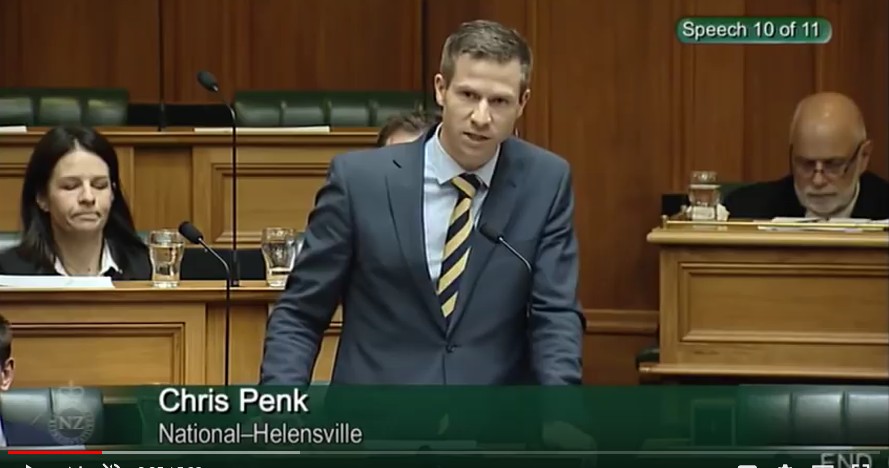
Thank you, Mr Speaker. I rise to speak against this bill. At the heart of this bill is the question of choice, and yet we must all acknowledge that assisted suicide, or euthanasia, by whatever name we call it, is a choice to end all choices. It is, by definition, irreversible, the end; that it shares with any other form of suicide. As such, we should proceed exceedingly carefully before even considering whether safeguards, so-called, may mitigate some of the worst aspects of it.
It is this nature of choice that is being promoted by those who have brought this bill to the House that we must attack. We must understand clearly the concepts of undue influence and coercion that undermine choice and that play on the minds of those who are vulnerable, and those who are vulnerable are the very ones who would be wanting to access this in that moment of time in their vulnerability.
In their depression, people are vulnerable. To be depressed is literally to be pushed down. When one is pushed down, one is not capable of making good decisions. One is not capable of understanding fully the consequences of one’s actions, and yet this bill would allow people the ability to make, in that vulnerable state, in that vulnerable condition, a choice that would end all other choices.
So many of our fellow New Zealanders, young and old, have already made that choice; they have no further choices left. It is a subject that this House rightly concerns itself with and should continue to do so. We must do more to discourage suicide and other forms of ending life prematurely, and not encourage more of it.
Much has been said on the subject of dignity, too. Those in favour of the bill, at least to the first reading stage, have described a situation of a life that they say lacks dignity at that point. Disabled constituents of mine have said to me, “Do not let anyone tell you that certain conditions equate to a lack of dignity. They are describing my life.” They say to me, “This is my life. I am happy with it. I have dignity, and for anyone in the Parliament to suggest otherwise is, quite simply, intolerable.”
We’ve heard about so-called safeguards; for example, the suggestion that one might be able to exercise this choice if one has a terminal illness. One might have a diagnosis of a terminal illness but not, in fact, have a terminal illness. One may have a mistaken diagnosis or, indeed, a mistaken prognosis, and one might make a decision based on that. And if that factual basis is proven to be incorrect, what recourse then does that person have? The answer is none, because the person will have died. Our criminal justice system admits the possibility of mistake as to facts and as to law.
Among other reasons, this is why we do not have a law of capital punishment; mistakes are made. If anyone in this House doubts that, they should ask Mr Teina Pora if that is so. If we allow people to be pressured into making a choice or to make the choice seemingly of their own volition but based on a mistaken assumption as to facts, and if the facts, so-called, prove to be incorrect later, there is no recourse, there is not opportunity to turn back the clock. They are, at that point, dead.
The intersection of our terrible rate of suicide in this country and our terrible record of elder abuse and neglect is this bill. There is much work we have to do in this Parliament on these subjects and, indeed, mental health in general. Will this bill encourage or undermine efforts to promote the real dignity, the real protection of life, the genuine role of the medical profession? I say, no; I say we reject it. And if you are in favour of euthanasia as a principle, I say to members of this House: this bill is not the one for you; it is far too broad. We should reject it.
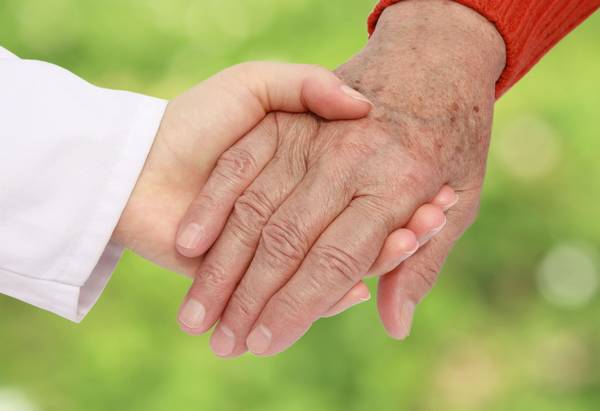
LifeSite News 22 December 2017
Sheila Lewis was in a coma and hadn’t had anything to eat or drink for 12 days. Her family expected her to die, but instead she woke up and asked for a glass of water.
Now she’ll be able to celebrate Christmas with her family.
On Labor Day, Sheila, a grandmother, began to rapidly lose her memory.
“She could not grasp what day it was,” daughter Brandy Arends told Forum News Service. She says they “instantly” know something was very wrong.
Indeed, something was very wrong.
“She kept saying my brain is in a fog,” Chasity Brandt, another of Sheila’s daughters, shared with WDAY-TV’s Kevin Wallevand. She forgot her grandchildren’s names, then her daughters’ names, then her own name.
In short order, Sheila was taken to a Fargo hospital, but her condition only worsened. She lost the ability to speak. Breathing and feeding tubes were put in. She was placed in the hospital’s Intensive Care Unit.
With no improvement, Sheila’s family eventually transported her to the Mayo Clinic. But even the Mayo Clinic’s expertise couldn’t help Sheila.
Arends said the “world-renowned doctors” at Mayo Clinic told her they had “never seen a case like” Sheila’s, according to a Twin Cities report.
“They didn’t even know what they were dealing with,” the daughter added.
Sheila fell into a coma. She lay unresponsive for weeks. Arends explained that her mother’s condition was described as a “vegetative state.”
Finally, the family decided to disconnect life support machines.
“Nothing more we could do,” Arends told Wallevand.
“We canceled plans and brought the kids down to say goodbye to grandma,” Brandt added.
After saying their goodbyes this side of eternity, Sheila was taken off life support. Her daughters planned her funeral, and bought black.
But Sheila didn’t die. Finally, comatose Sheila was brought to her daughter’s home under Hospice care.
Twelve long days – with no food, water, or oxygen assistance – went by. It had been six weeks since Sheila last uttered a word.
Then the miracle happened. Sheila asked for water.
READ MORE: https://www.lifesitenews.com/news/comatose-woman-unexpectedly-awakens-in-time-for-christmas-asks-for-water

NZ Herald 22 December 2017
• Wendi Wicks is convener of Not Dead Yet Aotearoa, a group of disabled people who do not support the legalisation of euthanasia or assisted suicide in New Zealand.
Family First Comment: A very good analysis of the ‘dodgy’ stuff that happened in Parliament last week with the 1st Reading on euthanasia… Disturbing.
“This bill is literally a matter of life and death. It’s not a time to cut corners, or do backroom deals for procedural advantage. We need to ensure choice is not only a choice to die, and not make life for disabled and other at-risk people even more risky. It’s a time to take the time to listen and think very carefully.”
Make a submission – www.protect.org.nz
David Seymour should buy a Lotto ticket
Something unusual happened in Parliament on Wednesday night of last week. Not the 76-44 vote in favour of the first reading of Seymour’s End of Life Choice Bill. That was entirely predictable.
No, it was what happened next which suggests that Seymour is very lucky indeed.
Seymour rose to move that the bill be referred to the Justice Select Committee which would have to report back within nine months. Just a procedural motion, right? Hmm.
The extraordinarily lucky thing for Seymour is that all eight members of that committee had just voted in favour of the first reading. All of them.
Call me suspicious, call me cynical, but that strikes me as … improbable. In fact, it’s a 2.6 per cent probability.
Here’s the maths: 76 of 120 members voted in favour, or a 63.33 per cent likelihood that any individual would vote in favour. The likelihood that 8 randomly selected members all voted in favour is therefore 0.6333 raised to the power of 8, which is 0.02588, or 2.6 per cent between friends.
So either Seymour is very lucky, or it wasn’t random at all. That it was in fact all arranged beforehand.
Now, that’s maybe clever inside politics, but maybe it’s also not very clever outside politics. Because it’s going to raise the level of scrutiny of how the Justice Select Committee goes about its work on this bill. Is it going to be an open, transparent and fair hearing of all New Zealanders who want to have their say?
When you come from a 25 per cent majority constituency (disabled people) who are alarmed to be directly in the loosey-goosey eligibility criteria cross hairs of this bill, open fair and transparent select committee dealings are minimum standard.
Will we get it? It’s a big ask for disabled people to trust the select committee process when there already appears to be a certain bias.
There’s an argument doing the rounds that the Health Select Committee finished its long hearings into Maryan Street’s petition earlier this year, so there’s no need to repeat the exercise.
Two things could be said here: first, that the select committee was not considering a bill but investigating the broader issues surrounding end of life in general, and suicide in particular. So New Zealanders have not yet had the chance to have their say about this particular bill.
Second – and pay attention now – six of the eight members of the Health Select Committee who issued the final report voted no at the first reading of Seymour’s bill. That is, 75 per cent of the people who actually read the evidence, and heard directly from New Zealanders, thought about it and said “No thanks, David”.
This bill is literally a matter of life and death. It’s not a time to cut corners, or do backroom deals for procedural advantage. We need to ensure choice is not only a choice to die, and not make life for disabled and other at-risk people even more risky. It’s a time to take the time to listen and think very carefully.
Or maybe buy a Lotto ticket and hope for the best?
http://www.nzherald.co.nz/index.cfm?objectid=11963888&ref=twitter
 Keep up with family issues in NZ.
Keep up with family issues in NZ.

Otago Daily Times 21 December 2017
Family First Comment: Still want that euthanasia?!
The proposed law is based on diagnoses – but it’s not always right. But the outcome could be deadly. Euthanasia is not safe.
www.protect.org.nz
After saying goodbye to her grandchildren and planning her funeral, Jan Scott did not expect to see another Christmas.
But last month the 70-year-old was told Dunedin Hospital’s diagnosis of terminal lung cancer was a mistake.
While relieved, she is angry she was never referred to an oncologist and was denied further treatment.
In June, Mrs Scott was told she had as little as five months to live, and the cancer was too advanced for chemotherapy or radiotherapy.
Her doctor was a respiratory consultant.
She was told a chest scan revealed a 21mm tumour on her left lung, ”shadows” on her other lung, and cancer in her lymph nodes.
She was referred to Otago Community Hospice for palliative care.
READ MORE: https://www.odt.co.nz/news/dunedin/distress-anger-after-cancer-misdiagnosis


Evening Report 4 October 2016
Family First Comment: This is a fascinating read by an investigative reporter….
“In my editorial titled: Be Aware and Beware of What You Demand – A Case Against State-Backed Euthanasia, I reflect back to the mid-1990s to an investigation I wrote that exposed how the government was to enforce exclusion criteria designed to prevent people from accessing life-saving but expensive treatments. If you were blind, intellectually disabled, had a history of mental illness, anti-social behaviour, a criminal conviction – you would be excluded from having renal dialysis. The experience of reporting this confirmed my resolve against state-backed-euthanasia. Here’s why… “ www.protect.org.nz
In my editorial titled: Be Aware and Beware of What You Demand – A Case Against State-Backed Euthanasia, I reflect back to the mid-1990s to an investigation I wrote that exposed how the government was to enforce exclusion criteria designed to prevent people from accessing life-saving but expensive treatments. If you were blind, intellectually disabled, had a history of mental illness, anti-social behaviour, a criminal conviction – you would be excluded from having renal dialysis. The experience of reporting this confirmed my resolve against state-backed-euthanasia. Here’s why…
Back in the mid 1990s Jenny Shipley (then Minister of Health in the Bolger National Government) established a governmental body called the Core Health Services Committee (CHSC) which was chaired by former broadcaster Sharon Crosbie.
The CHSC was known to exist, but no one paid much attention to it, and also getting information out of it was problematic as it would cite commercial confidentiality as a reason for withholding information. So a lot of its work went under the radar.
Back then, National had created a commercial model that replaced health boards with Regional Funding Authorities (RHAs) and hospitals became Crown Health Enterprises. It wasn’t until 2000, that the new Helen Clark-led Labour-Alliance Government disestablished the RHAs and CHEs and reestablished publicly elected health boards, and, hospitals became public hospitals once again.
But back in the early to mid-1990s the Core Health Services Committee was accountable directly to the Minister of Health, Jenny Shipley, and was tasked with creating health funding frameworks, protocols, criteria that the then RHAs would rely upon when deciding what health services the government would pay Crown Health Enterprises (CHEs) for – when providing health ‘services’ to ‘clients’ (patients).The Core Health Services Committee was tasked to evaluate a way of reducing the cost-burden on the Government for health services and come up with a set of criteria that CHEs and doctors would have to abide by when deciding which ‘clients’ (patients) would get treatment and, importantly, who would not.
In August 1994, I became aware that the Core Health Services Committee had been evaluating the most costly procedures, including renal dialysis treatment for people with end-stage renal failure. I was told by sources that the CHSC had drafted a document that included a framework for how expensive treatments would be handled, and that the Minister of Health had approved the plan.
Generally, there are two types of criteria:
inclusion – (meaning patients that met certain criteria would be eligible for treatment)
exclusion – (meaning those that could be labeled as possessing or exhibiting specific criteria would exclude then from being offered treatment.
READ MORE: https://eveningreport.nz/2016/10/04/editorial-be-aware-and-beware-of-what-you-demand-a-case-against-state-backed-euthanasia/

The Daily Blog 17 December 2017
Family First Comment: We are being conned into believing euthanasia is a solution to a fear of living in pain during death that isn’t the reality for the vast majority of us.
This legislation is to appease alpha personalities who can not tolerate the idea of needing help in the painful end of their lives, but it will be used against the poorest and most vulnerable who are already so easily abused by the State.
Self-assisted suicide – which is what we are really discussing here, not the far more sterilised ‘euthanasia’, will become a means to a neoliberal end in NZ.
There is a neoliberal seductiveness about euthanasia.
It creates this false narrative of ‘choice’ and puts us all in the fake position of ‘what if it was me’.
The truth is that the vast majority of those who die do so without immense pain and suffering, this is legislation for the exceptions, not the rule…
Many people fear death partly because of the perception they might suffer increasing pain and other awful symptoms the nearer it gets.
There is often the belief palliative care may not alleviate such pain, leaving many people to die excruciating deaths.
But an excruciating death is extremely rare, reports The Conversation.
The evidence about palliative care is that pain and other symptoms, such as fatigue, insomnia and breathing issues, actually improve as people move closer to death.
More than 85 percent of palliative care patients have no severe symptoms by the time they die.
Evidence from the Australian Palliative Care Outcomes Collaboration (PCOC) at the University of Wallongong shows that there has been a statistically significant improvement over the last decade in pain and other end-of-life symptoms.
…more than 85% of palliative care patients have no severe symptoms by the time of death? The issue here is that palliative care is expensive, and what the Government are suggesting is cost cutting.
It should come as no surprise that ACT, the far right political party are pushing for this reform. For them it is the perfect collusion of total individualism (the act to kill yourself) and the purity of the market to efficiently end those no longer contributing.
Self-assisted suicide – which is what we are really discussing here, not the far more sterilised ‘euthanasia’, will become a means to a neoliberal end in NZ.
Look at the horrific manner in which NZs institutes treat the most vulnerable. Look at how we treat the mentally ill, the poor and prisoners. How long do any of you honestly believe it will take for some Wellington bureaucrat to start planning to use this legislation for all those costing the health budget?
It happened before under National in the 1990s, and that was when euthanasia was illegal.
We are being conned into believing euthanasia is a solution to a fear of living in pain during death that isn’t the reality for the vast majority of us.
This legislation is to appease alpha personalities who can not tolerate the idea of needing help in the painful end of their lives, but it will be used against the poorest and most vulnerable who are already so easily abused by the State.
https://thedailyblog.co.nz/2017/12/17/the-neoliberal-seductiveness-of-euthanasia/
 Keep up with family issues in NZ.
Keep up with family issues in NZ.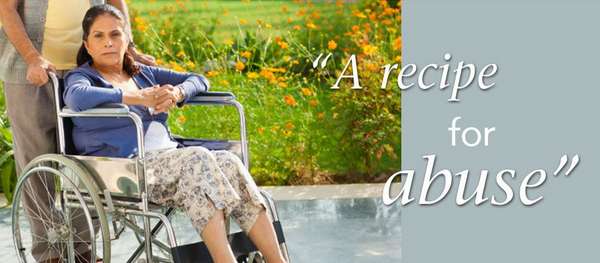
NewsTalk ZB 14 December 2017
Family First Comment: Christchurch woman Claire Freeman lost all movement in her limbs after a car accident when she was 17. She was told by health professionals that given the extent of her injuries, travelling overseas for assisted suicide was a legitimate option. “That would definitely have been something that I would have actively pursued had it been legal and I’m just so grateful now that it is not.”
www.PROTECT.org.nz to make a Submission
A tetraplegic says a voluntary euthanasia bill that has passed its first reading needs significant changes.
Christchurch woman Claire Freeman lost all movement in her limbs after a car accident when she was 17.
She told Larry Williams in the wake of her accident, she was told by health professionals that given the extent of her injuries, travelling overseas for assisted suicide was a legitimate option.
“That would definitely have been something that I would have actively pursued had it been legal and I’m just so grateful now that it is not.”
She said assisted suicide has a place in the event of a painful and terminal illness, but should not be allowed for those with grievous injuries like hers.
Claire said she attempted to end her own life after her accident and now regrets considering suicide.
“You don’t know what it’s like until you have it and my problem wasn’t my injury it was my misguided coping mechanism.”
http://www.newstalkzb.co.nz/on-air/larry-williams-drive/audio/claire-freeman-euthanasia-bill-needs-significant-changes/

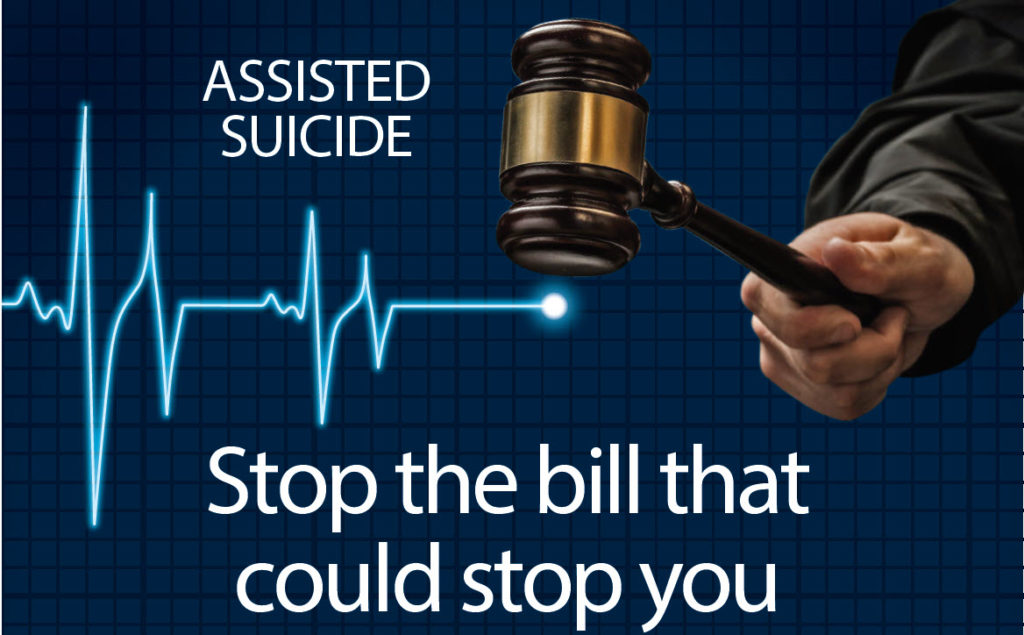
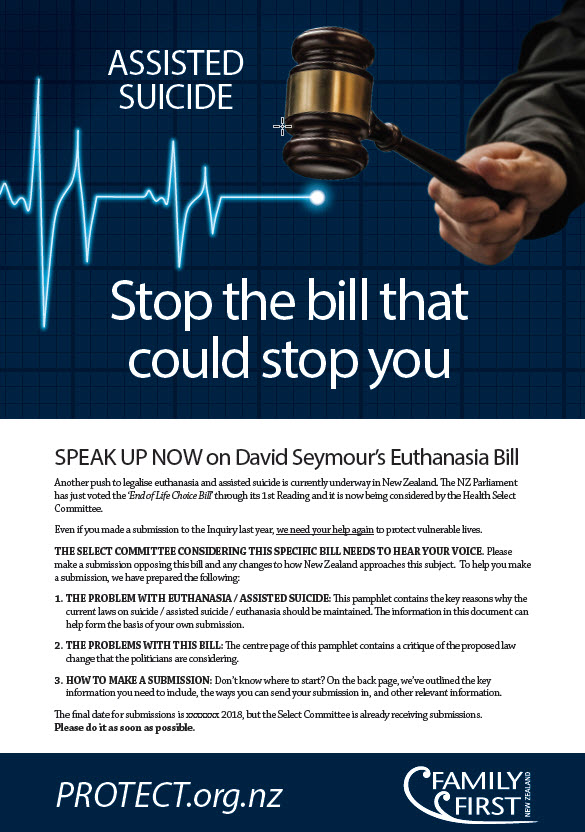 Yes – we know that Christmas is just around the corner – and probably the last thing you want to do is think about euthanasia / assisted suicide.
Yes – we know that Christmas is just around the corner – and probably the last thing you want to do is think about euthanasia / assisted suicide.
But the Select Committee considering David Seymour’s euthanasia bill (whose members interestingly ALL voted for euthanasia in the 1st Reading!) have set the deadline for submissions as soon as 20 February 2018. They seem to be hoping that you’ll be too distracted by the festive and holiday season to get around to making a submission against the bill. Let’s disappoint them!
So we’ve done all the ‘prep work’ for you. Our 16-page Submission Guideline resource contains:
1. the key reasons why the current laws on suicide / assisted suicide / euthanasia should be maintained. This will help you get started with ideas for your submission
2. a critique of the key part of the specific law change proposed by Seymour
3. the key information you need to include, the ways you can send your submission in, and other relevant details.
Q: I made a submission to the recent Inquiry. Do I need to make another submission to the Inquiry?
A: YES! This is a separate consideration which involves a potential law change
Q: So can I use similar material to what I did in my previous submission?
A: Absolutely, although we would encourage you to read our resource first to refresh your mind and to take into account the specifics of the proposed law change
Q. Just remind me – what’s the latest date I can make a submission?
A: You have until 20 February 2018 (but why not do it this weekend!) Then you can have a total break in January. The beginning of the year can always be a bit chaotic
Q. I’d like to make this info available to friends and family. Is there a printed pamphlet that I can distribute?
A: Glad you asked! Yes we are printing the Submission Guideline and distributing in January (or as soon as you get back from holiday). Use the link below to place orders for your group / church / organisation.
READ THE SUBMISSION GUIDELINES
ORDER COPIES OF THE PAMPHLET FOR YOUR GROUP / CHURCH
Email [email protected] with the following details.
Name:
Name of Group / Church / Organisation (to avoid double ups):
Delivery Address:
Contact phone number:
Quantity requested:
No cost – although any donation towards printing and postage gratefully received!